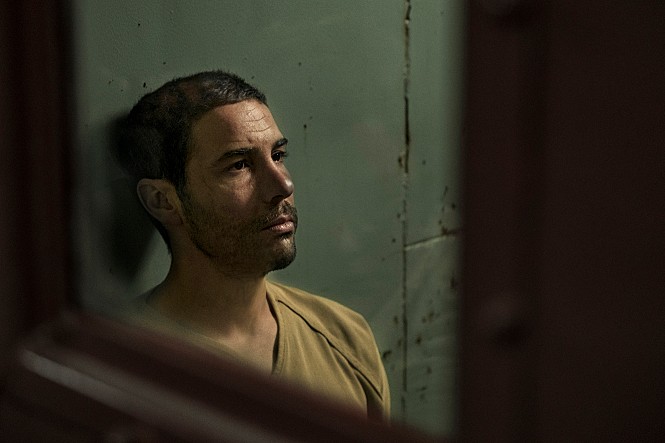Kevin Macdonald’s new film “The Mauritanian” is a flawed but earnest legal drama which could be better if it stuck more to its unjustly imprisoned hero. Yes, the movie sometimes loses its narrative focus and momentum as shuffling around several other main characters involved with its hero’s undeniably infuriating situation, but it is at least firmly anchored by its lead actor’s strong performance, and I came to observe its hero’s harrowing human drama with more care and attention.
Tahar Rahim, a wonderful French actor whom I came to notice via his unforgettably electrifying performance in Jacques Audiard’s great film “A Prophet” (2009), plays Mohamedou Ould Salahi, a plain Mauritanian Muslim guy who suddenly found himself becoming a target to be investigated by the US government shortly after the 9/11 incident. Besides his past association with the Al-Qaeda around the 1990s, one of Salahi’s cousins called him once via a phone belonging to Osama bin Laden, and he was well aware of that he was really in a big trouble, but, alas, the circumstance turned out to be far worse than expected shortly after he was taken away from a family wedding. He was soon taken to somewhere in Afghanistan, and then, like many other potential suspects targeted by the US government during that time, he got imprisoned in Guantanamo Bay detention camp for next three years without charge or trial.
Salahi’s ongoing plight is mainly viewed through a prominent human rights lawyer named Nancy Hollander (Jodie Foster), who simply comes to accept his case in 2005 as a favor to one of her close colleagues. As she and her assistant Teri Duncan (Shailene Woodley) embark on working on the case, Hollander becomes more passionate about how to get her new client a fair trial in US, and it does not take much time for her to gain the trust from Salahi, who understandably shows tired resignation at first but then comes to agree to be represented by Hollander and Duncan.
However, Hollander and Duncan soon come to face a series of obstacles as preparing for the legal defense for Salahi. While they are allowed to correspond with Salahi via letters which are handled under some heavy security procedures in advance, the US government does not provide much information on what Salahi was exactly accused of – or whether he is really guilty of that. At one point, many stacks of government documents are delivered to Hollander and Duncan, but, to their frustration and exasperation, nearly all of them are heavily censored without informing them on anything at all.
Meanwhile, the movie also pays considerable attention to Lieutenant Colonel Stuart Couch (Benedict Cumberbatch), a US military prosecutor who willingly agrees to handle the case because one of his close friends was killed during the 9/11 incident. Quite determined to prove that Salahi is indeed guilty as charged without any loose end, he and several men under his command busily work on their important task, but it does not take much time for him to have doubt and suspicion – especially when he is not allowed to learn more about how interrogations on Salahi were executed at the Guantanamo Bay detention camp.
As Salahi gradually tells his lawyer more about what he went through during last several years, we accordingly get a series of flashback scenes, which constantly emphasize the sense of isolation and suffocation surrounding him via the screen ratio of 1.33:1. While he tried to deal with his plight as much as he could, things only got worse for him without any hope, and the movie later shows us a number of grueling moments involved with what was infamously termed as “enhanced interrogation techniques”.
However, the screenplay M.B. Traven, Rory Haines, and Sohrab Noshirvani, which is based on Salahi’s 2015 memoir “Guantanamo Diary”, often stumbles as busily juggling its several different narratives. While a narrative depicting Salahi’s plight is surely the most powerful one, its dramatic power is often interrupted by the other ones which feel less compelling in comparison, and these ones are also saddled with several clichéd scenes, which are rather artificial especially compared to those brutally raw scenes unfolded inside at the Guantanamo Bay detention camp.
Anyway, under Macdonald’s competent direction, his four main cast members try their best to elevate the story and characters, though not all of them succeed. Rahim did a commendable job of conveying to us his character’s fear, pain, and desperation without any ounce of exaggeration, and he later has a very poignant scene where his character must try as much as he can for delivering a sincere appeal to the court. While Jodie Foster, who somehow won the best supporting actress award for this film at the Golden Globe Awards a few weeks ago, is fairly effective in her low-key performance which does not overshadow her co-star at all, Shailene Woodley is unfortunately stuck in her thankless supporting role, and Benedict Cumberbatch is suitably unflappable as a by-the-book prosecutor who does not tolerate any foul play at all in his case.
On the whole, “The Mauritanian” does not reveal or tell anything new to you if you have ever seen similar political films such as “The Road to Guantanamo” (2006) or “Rendition” (2007), but it is still worthwhile to watch mainly thanks to the solid performances from its several main cast members. I was not that shocked or enlightened during the viewing, but its story feels relevant even at present, so I recommend it with some reservation.










